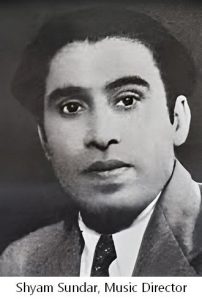 Introduction
Introduction
In the pre-Partition era before 1947, both Bombay and Lahore stood as vibrant centers of the film industry in India. It was during this time that Mohammad Rafi, a name synonymous with soulful melodies, embarked on his musical journey. This article explores Rafi’s trajectory, from his debut in Lahore to his poignant farewell in Bombay.
Lahore Days: The Rise of a Star
In the golden age of music, Mohammad Rafi’s journey began when he lent his voice to a poem by Firoz Nizami on Lahore Radio Station. This pivotal moment marked Rafi as a respected figure in the Lahore Film Industry. His breakthrough came with the Punjabi film, Gul Baloch (1944), where he delivered his inaugural rendition, Soniye Ni Heeriye Ni Teri Yaad Ne Aan Sataya …. This soul-stirring song not only showcased Rafi’s vocal prowess but also marked his first collaboration with the renowned Music Director, Shyam Sundar.
Decades Later: A Farewell Masterpiece
The legendary Rafi Sahab had just finished recording for a song in Aas Paas (1981) when an unexpected turn of events unfolded. As he was heading towards his car at the iconic Mehboob Studios in Mumbai, he was halted by none other than the acclaimed Laxmikant-Pyarelal duo. They had a request: a few lines needed to be re-dubbed, and they turned to Rafi Sahab for his magical touch.
Initially, Rafi Sahab, always a professional, agreed to re-dub the lines the next day. However, in a surprising move that showcased his commitment to perfection, he had a change of heart. While seated in his car, he decided to step out and return to the studios, conveying to Laxmikant-Pyarelal that it was better to finish the re-dubbing immediately rather than leave it pending.
The result was the soul-stirring rendition of Tu Kahin Aas Paas Hai Dost … recorded on that very evening. Little did anyone know that only few hours later would Rafi Sahab leave this world to entertain the Creator of the world.
This last-minute recording not only highlights the purity of Rafi Sahab’s voice, his soul-stirring singing and unwavering dedication to his work but also etched this recording session into the annals of musical history.
A Poignant Farewell: Bombay Mourns
Tragically, this recording would be Rafi’s swan song. The next morning brought the devastating news of Rafi’s passing, sending shockwaves through the industry. Bombay (former name of Mumbai) came to a standstill as tens of thousands of grief-stricken fans defied relentless rain to catch a glimpse of their beloved hero. Traffic in Bombay was paralyzed as people from diverse backgrounds, religions, castes, and creeds poured onto the streets to pay homage to the legendary singer.
Conclusion
Rafi Sahab’s musical journey from Lahore to Bombay encapsulates the essence of an era and the profound impact of his voice on the Indian film industry. His first and last recorded songs stand as bookends to a remarkable career that left an indelible mark on the hearts of millions. As fans continue to cherish his timeless melodies, Rafi Sahab’s legacy lives on, forever echoing through and well beyond the corridors of Indian cinematic history.
Next article will proudly discuss the making of Man Tarpat Hari Darshan Ko Aaj …, a testament to India’s unity in diversity.

